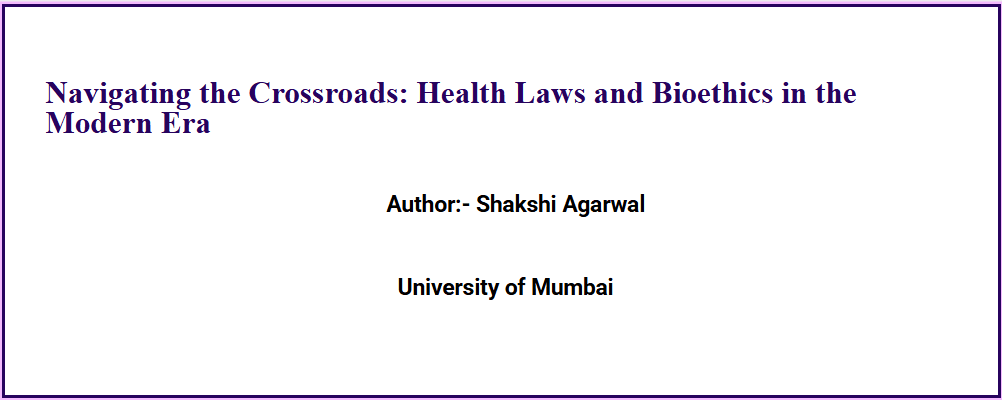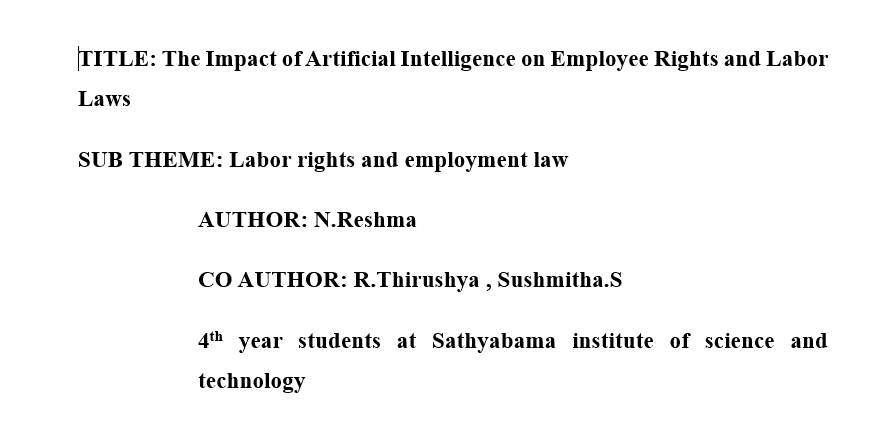Abstract
Abstract
As healthcare advances today, the intersection of health law and bioethics is essential to protecting people’s rights and dignity. It also contributes to the advancement of medicine. The development of medicine, genetics, and biotechnology poses ethical and legal challenges that must be carefully considered. Health law provides guidelines that guide the interactions between physicians, health departments, and patients to ensure fair and safe care. Bioethics examines the ethical aspects of behaviour. Doctors protect schools, people, and society’s rights, especially their role in modern healthcare. Topics discussed include patient autonomy, informed consent and medical negligence. The right to life and new technologies such as gene therapy explore these issues. This article highlights the need for both legal and ethical healthcare governance. As health reform progresses worldwide, understanding the balance between health policy and bioethics is essential to developing health systems that protect citizens’ health testing and respect for ethical standards.
____________________
- Georgetown Law, Health Law, Policy, and Bioethics, https://curriculum.law.georgetown.edu/jd/health-law-policy-bioethics/health-law-policy-bioethics.pdf.
- Touro Law Center, The Institute for Health Law, Bioethics, and Policy, https://www.tourolaw.edu/academics/health-law-institute.
- I. Glenn Cohen, Bioethics: The Law, Medicine, and Ethics of Reproductive Technologies and Genetics, Harvard Online (2024), https://www.harvardonline.harvard.edu/course/bioethics-law-medicine-and-ethics-reproductive-technologies-and-genetics
- Touro Law Center, The Institute for Health Law, Bioethics, and Policy, https://www.tourolaw.edu/academics/health-law-institute
- Georgetown Law, Health Law, Policy, and Bioethics, https://curriculum.law.georgetown.edu/jd/health-law-policy-bioethics/health-law-policy-bioethics.pdf.
Introduction: The Changing Landscape of Healthcare
Health is constantly changing. Over the decades, a fine line has remained between scientific innovation and human values. And medical advances have raised questions about human dignity. Independence and Ethical Responsibility Health law and bioethics are the laws and regulations that govern ethical decision-making. It is an important basis for making medical decisions. Bioethics refers to moral principles. Because the health law provides for the protection of health facilities. Both can help practitioners and policymakers navigate the complexities of today’s health system. From ethical dilemmas related to technology to the standardization of medical practices. Issues arise from this relationship and the need for a system that respects the individual’s right to treatment. From medical regulation to ethical issues related to biotechnology. The following discussion will explore how these two areas work to improve future healthcare.
Health Laws: Defining the Framework of Healthcare
Health law provides the legal basis for health. Protect patients’ rights, clarify responsibility, and ensure safe and fair treatment. These rules are constantly changing. They cover everything from medical negligence to privacy and consent .
Patient Rights and Autonomy
Modern health law values patient personality rights. This is the individual’s right to make decisions about their health care. Laws such as the US Patient Protection and Access Act (PPACA) and the Indian Patient Bill of Rights reaffirm the right of patients to make informed decisions about their care. Health law and bioethics are concerned with the idea that patients should understand their treatment and its consequences. These protections help prevent searches and extortion.
_____________________
- Georgetown Law, Health Law, Policy, and Bioethics, https://curriculum.law.georgetown.edu/jd/health-law-policy-bioethics/health-law-policy-bioethics.pdf.
- Touro Law Center, The Institute for Health Law, Bioethics, and Policy, https://www.tourolaw.edu/academics/health-law-institute.
- Touro Law Center, The Institute for Health Law, Bioethics, and Policy, https://www.tourolaw.edu/academics/health-law-institute.
- Georgetown Law, Health Law, Policy, and Bioethics, https://curriculum.law.georgetown.edu/jd/health-law-policy-bioethics/health-law-policy-bioethics.pdf.
Informed Consent
Informed consent is an important part of health law. Requires doctors to share all information about medical procedures. Your risks and benefits help patients make decisions based on their own values. Bioethics supports this view. The focus is not only on transparency. But it also involves respecting the patient’s freedom and minimizing adverse effects. Lack of informed consent can lead to medical malpractice claims and serious ethical issues .
Medical Malpractice and Liability
Medical negligence law protects patients from holding professionals liable for negligence that causes harm. These laws play an important role in the development of medicine. Preventing or neglecting the health of the patient. Bioethics supports these standards. It is a moral duty to care for both patients.
Regulation of Healthcare Institutions
Health law also regulates the health system. Including hospitals, clinics, and pharmaceutical companies. These regulations regulate ethical business practices and the equitable distribution of services. To prevent fraud, abuse, and unethical behavior, Health law supports a health system that prioritizes access and equity.
____________________
- I. Glenn Cohen, Bioethics: The Law, Medicine, and Ethics of Reproductive Technologies and Genetics, Harvard Online (2024), https://www.harvardonline.harvard.edu/course/bioethics-law-medicine-and-ethics-reproductive-technologies-and-genetics.
- Touro Law Center, The Institute for Health Law, Bioethics, and Policy, https://www.tourolaw.edu/academics/health-law-institute.
- I. Glenn Cohen, Bioethics: The Law, Medicine, and Ethics of Reproductive Technologies and Genetics, Harvard Online (2024), https://www.harvardonline.harvard.edu/course/bioethics-law-medicine-and-ethics-reproductive-technologies-and-genetics.
Bioethics: The Moral Compass of Medicine
Bioethics addresses moral issues related to medical practice and research. By advising on various issues from patient rights to the ethical distribution of resources. Embora’s health law sets structural boundaries. Bioethics emphasizes principles such as the sanctity of life, justice, and impartiality .
The Principle of Autonomy
Autonomy gives individuals the right to make choices about their bodies and health care. No medical context including the right to refuse treatment. This guarantees that patients will not be forced to make decisions that conflict with their beliefs. Legal protections, such as the right to refuse treatment, adhere to these principles of bioethics. Respecting personal freedom in healthcare
The Ethics of Medical Research
Ethics in medical research is important. This is especially true in studies involving vulnerable populations. Historical cases or studies have found syphilis in the Tuskegee sublingual or have had the potential to be abused. Bioethics provides protections for respecting human dignity and rights in research. Emphasis is placed on acknowledgement and consent. Prevention of harm and social benefits
Reproductive Ethics
In reproductive medicine Bioethics and health law cross over issues such as in vitro fertilization. Pig pregnancy, abortion and genetic screening. Health law regulates various aspects. Of these practices, Bioethics, on the other hand, addresses deeper moral issues, such as when life begins. And the ethical implications of genetic intervention .
_________________
- Georgetown Law, Health Law, Policy, and Bioethics, https://curriculum.law.georgetown.edu/jd/health-law-policy-bioethics/health-law-policy-bioethics.pdf.
- University of Minnesota Law School, Health Law & Bioethics Concentration, https://law.umn.edu/academics/concentrations/health-law-bioethics-concentration
- Georgetown Law, Health Law, Policy, and Bioethics, https://curriculum.law.georgetown.edu/jd/health-law-policy-bioethics/health-law-policy-bioethics.pdf.
- Harvard Law School, Health, Food, and Drug Law, https://hls.harvard.edu/areas-of-interest/health-law/.
- University of Minnesota Law School, Health Law & Bioethics Concentration, https://law.umn.edu/academics/concentrations/health-law-bioethics-concentration
End-of-Life Decisions
Endless lifelong care raises complex ethical issues. From euthanasia to palliative care Bioethics provides a framework for evaluating these questions. Create a balance between independence kindness harmlessness and respect for cultural and religious values . Legal systems vary around the world. However global bioethics emphasizes the importance of respecting individual decisions.
Emerging Issues at the Intersection of Health Law and Bioethics
As technology advances New ethical and legal issues are emerging such as gene editing, IA healthcare and biobanks, and many more .
Genetic Editing and CRISPR
Gene editing technologies such as CRISPR raise complex ethical questions: Should genetic modification be allowed? Especially if it is not for medicinal purposes or not. Bioethics raises concerns about pregnant babies and their unintended consequences. Meanwhile, health legislation must take steps to ensure the responsible use of these powerful technologies .
Artificial Intelligence in Healthcare
Medical negligence law protects patients from holding professionals liable for negligence that causes harm. These laws play an important role in the development of medicine. Preventing or neglecting the health of the patient. Bioethics supports these standards. It is a moral duty to care for both patients.
__________________
- University of Pittsburgh, Center for Bioethics and Health Law, https://www.bioethics.pitt.edu/.
- I. Glenn Cohen, Bioethics: The Law, Medicine, and Ethics of Reproductive Technologies and Genetics, Harvard Online (2024), https://www.harvardonline.harvard.edu/course/bioethics-law-medicine-and-ethics-reproductive-technologies-and-genetics.
- I. Glenn Cohen, Bioethics: The Law, Medicine, and Ethics of Reproductive Technologies and Genetics, Harvard Online (2024), https://www.harvardonline.harvard.edu/course/bioethics-law-medicine-and-ethics-reproductive-technologies-and-genetics.
- University of Pittsburgh, Center for Bioethics and Health Law, https://www.bioethics.pitt.edu/.
University of Minnesota Law School, Health Law & Bioethics Concentration, https://law.umn.edu/academics/concentrations/health-law-bioethics-concentration
Biobanks and Data Privacy
Biobanks collect biological samples for research. Given privacy concerns and authorization of genetic information, issues of access to and ownership of genetic information require legal and ethical considerations to ensure data protection and responsible use.
Conclusion: Bridging the Gap between Law and Ethics
Health law and bioethics are important for the future of medicine. New technologies make it difficult to define legal boundaries and principles that respect human dignity. Developments in health law and bioethics must continue. Physicians, policymakers, and ethicists must work together to create standards that protect individual rights. While supporting treatment. Such collaborations are critical to solving emerging health problems and promoting justice and love. By fighting for a system that promotes fairness and understanding. He added that law, ethics and efficiency must work together to protect patients’ rights and conduct medical research.
_________________
- University of Pittsburgh, Center for Bioethics and Health Law, https://www.bioethics.pitt.edu/.
- Touro Law Center, The Institute for Health Law, Bioethics, and Policy, https://www.tourolaw.edu/academics/health-law-institute.
- I. Glenn Cohen, Bioethics: The Law, Medicine, and Ethics of Reproductive Technologies and Genetics, Harvard Online (2024), https://www.harvardonline.harvard.edu/course/bioethics-law-medicine-and-ethics-reproductive-technologies-and-genetics.





Leave a Reply